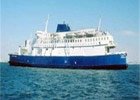
Reported here:
An investigation into the sinking of a Red Sea ferry blamed a "wicked collaboration" between the ship's owners and corrupt safety inspectors for the disaster that killed some 1,000 people, an Egyptian news agency reported Wednesday.More here:
The parliamentary committee investigating the Feb. 3 sinking also accused the Egyptian government of failing to launch a prompt rescue operation, the semiofficial Middle East News Agency reported.
The report into the Feb. 3 sinking of the Al-Salam Boccaccio 98 found it was overloaded and using forged documents to hide a shortage of safety equipment. The report said authorities and the owners negligently allowed the ship to sail between Egypt and Saudi Arabia despite serious shortcomings.
Government incompetence and "wicked collusion" between the ferry owner and a government agency resulted in the drowning of more than 1,000 people in the Red Sea in February when an Egyptian passenger ferry sank, according to the findings of a preliminary parliamentary investigation that were released Wednesday.And here:
Touching the highest and most sensitive levels of the government, including President Hosni Mubarak and the military command, though without directly naming either, a parliamentary committee issued a report that crushed the government's earlier efforts to blame the sinking of the ferry, the Salam Boccaccio 98, solely on the captain.
Blocked drains on the car deck of a ferry which sank in the Red Sea in February contributed to a disaster in which more than 1,000 people lost their lives, an Egyptian parliamentary report said.Whether the Egyptian government was complicit or not, the ferry owner's assets have been frozen as reported here.
The report, obtained by Reuters on Wednesday, said that as water sprayed by crew members tackling a fire built up on the deck, passengers dived down into the water and pulled out paper and plastic bags to try to unblock the drains.
The Salam 98 sank in the Red Sea early on Feb. 3 while on a journey from Daba in Saudi Arabia to Safaga in Egypt.
It was one of the worst marine disasters in Egyptian history and has led to widespread criticism of the crew, the shipping company and the government regulatory authorities.
The report said: "This (the accumulation of water on the car deck) was one of the direct reasons for the ship listing and then sinking. It shows that they (the drains) had not been inspected by the Maritime Safety Board."
In a conversation on the bridge, preserved by a data recorder, the captain of the ferry told his first officer, named as Massoud, that the drains were blocked and should be cleared.
As noted above, early reports cited the captain of the ferry for blame and lack of safety actions in the face of he disaster:
The Egyptian government laid more blame on Wednesday on the captain of the ferry which sank in the Red Sea in February with the loss of more than 1,000 lives.
A cabinet statement said analysis of the recording of the conversation on the bridge of the Salam 98 showed the captain did not take any of the important safety measures.
It said the captain did not send a distress signal, did not report his problems to either the port of departure or the port of arrival, did not try to return to port when fire broke out and did not order the crew or passengers to use rescue systems.
The Egyptian government was a tad indecisive in deciding what help to seek, as reported here:
Rescue efforts appeared confused. Egyptian officials initially turned down a British offer to divert a warship to the scene and a U.S. offer to send a P3-Orion maritime naval patrol aircraft to the area. Then Egypt reversed itself and asked for both -— then finally decided to call off the British ship, deciding it was too far away to help, said Lt. Cdr. Charlie Brown of the U.S. 5th Fleet, based in Bahrain. In the end, the U.S. craft - which has the capability to search underwater from the air -— was sent, but the British ship was not, he said.Good coverage here at the Christian Science Monitor:
Four Egyptian rescue ships reached the scene Friday afternoon, about 10 hours after the ferry likely went down some 57 miles off the Egyptian port of Hurghada.
Al Salam Maritime Transport Company, the ferry's owner, and Egyptian authorities have maintained that the ship passed inspection and met all international safety standards. But analysts are questioning how such a disaster could occur if this was the case.Apparently, Gamal Abul Azm knew what he was speaking about...
"I've been working in the sea for 50 years and [Egypt's shipping standards and regulations] are not something to be proud of," says Gamal Abul Azm, an Egyptian maritime expert. "The owners of the vessel said that it had been inspected and that they followed all regulations. They can prove it on paper, but in reality there are a lot of gaps."
When a 1000 people die, you might expect some harsh words to follow.

No comments:
Post a Comment